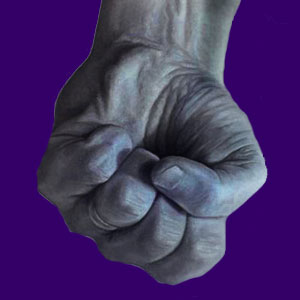
Chronically clenching the fists can be a sign of internal psychoemotional tension and a symptom of a mindbody pain disorder. Many readers have described an unconscious disposition towards fist clenching, even when they seem relaxed or are even sleeping. This is not a natural hand posture and can even become quite painful when the habit persists over time.
As specialists in mindbody medicine, we tend to observe and document the physical characteristics of patients and the expressions of repressed and suppressed emotional issues that present themselves unknowingly in their mannerisms. One of the major and often seen of these characteristics is certainly unconscious fist clenching.
This mindbody medicine essay delves into clenched fists as an expression of internalized tension and a possible symptom of a mindbody pain syndrome. We call upon of many years of experience in this field to present convincing evidence that fist clenching is most commonly an indicator of turmoil below the conscious surface.
Clenching the Fists for No Reason
When we begin to converse with patients about why they clench their fists, most are first surprised that we have noticed this phenomenon and then quite unsure how to explain why they do it. Fist clenching is an obvious physical expression to any trained observer and will often worsen when a person is focused on the psychoemotional realm, such as when being asked about sensitive issues in their life or present negative circumstances.
Most patients will play down their clenching until we have the opportunity to explain to them just how relevant the symptom truly is. At this point, they often realize themselves just how often and how strong they are clenching their fists regularly throughout almost every day of their lives. Once they perceive that they are doing this action, many will also realize just why they might be experiencing pain in the hands, fingers, wrists and might even begin to get a better idea why their possible previous treatment for (misdiagnosed) carpal tunnel syndrome was ineffective.
There is always a reason to explain symptomology such as chronic fist clenching. One only needs to dig a bit deeper into the mind to route it out and make the patient aware of its subconscious origins. Recognition of the problem is the first and most important step towards resolving it. This is a classic truth of all mindbody syndromes.
Clenched Fist Explanations
Clenching the fists is identical in expression and motivation to many other muscular tightening habits, such as clenching the buttocks, clenching the jaw and raising the shoulders. These physical manifestations are all traditionally recognized signs of problematic psychoemotional activity below the level of consciousness. In many cases, they are also expressions of consciously-recognized stresses, as well.
Tightness signifies resistance and internalization of stresses, as if to bury the troubles deep down and hope that they will remain hidden away. Ironically, it is this very suppression/repression habit that creates the painful expressions in the first place, so what we have is a truly vicious cycle of suffering that fuels itself until the cycle is broken.
Fist clenching, in particular, is a sign of repressed anger and hurt, often left over from childhood, which is when the habit usually developed. We see all the classic signs of this in young patients who are asked to write during an interview about their lives. Some are so tight holding a pen that they can barely make the tool perform its most basic task of expressing themselves about their feelings.
Personally, I can also say that I have experienced fist clenching throughout my life. It made it difficult for me to write with a pen at some stages of life and created wrist pain for me during my youth. Now, I see clenching as one of the many physical barometers of my emotional state and if I catch myself doing it, I immediately get to work scanning through my mind for any potential reasons why before they have the opportunity to create pain in my body.
Stop Clenching the Fists
Fist clenching is not usually the worst expression of tension myositis syndrome and can actually be a useful tool for introspective self-observers. However, it is important to stop clenching the fists, as this is a negative physical expression that seeks to cover up feelings of anger, violence and victimization. Once a person is aware of their tendency to clench, they are already on the road to stopping the habit if they choose to pursue this worthwhile objective.
We discuss the relevance of fist clenching in many of our literary works and it is certainly a major point of coverage in our self-help program for chronic pain. However, you can also do independent research on the symptom and use your own internal compass to guide you towards relief using any quality knowledge therapy program. The one thing you should not do is ignore the symptom. In most cases, manifestations will grow until a major health threat exists, if it does not already. Remember, that many of you are here on this site to learn more about some form of chronic pain and came across this discussion on fist clenching. Is this a coincidence? Of course not…





